
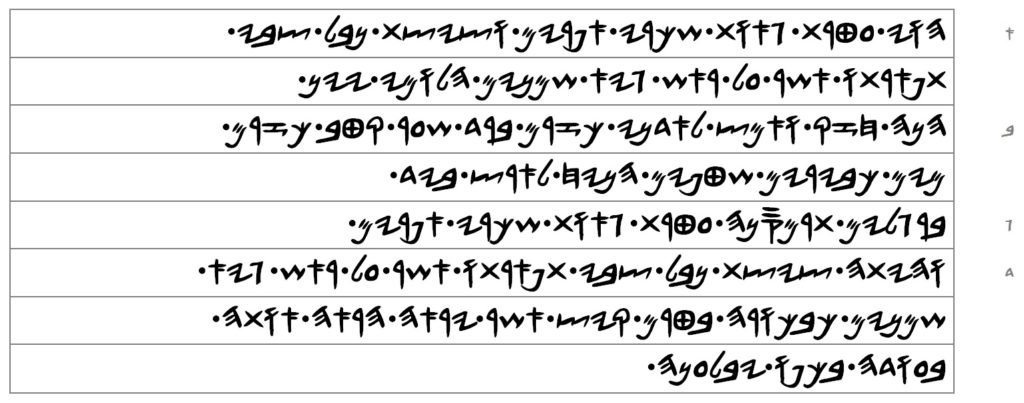
[1] ho’ay ghatarath ga’oth shachary Aparaym wa-tsaytsath nabal tsabay thap’aratho ashar ghal ra’ash gay’ shamanaym ha-lomay yayn
Woe to the crown of the rising smoke column of the intoxicated ones of Aparaym, and the flower of foolishness, glorious in its beauty, which is upon the top of the valley of oils: the ones addicted to inebriation
[2] hanah khazak wa-amats la-adanay cha-zaram barad shair katab cha-zaram maym chabayraym shatapaym hanaykh la-arats ba-yad
Behold, strength and might belong to the Lord, as a heavy downpour of falling stones, a horrific destruction, as a heavy downpour of mighty waters overflowing: He is causing to lay down to the earth by hand.
[3] ba-ragalaym THAramasnah ghatarath ga’oth shachoray Aparaym
By the feet will they be trodden down, the crown of the rising smoke column, the intoxicated ones of Aparaym.
[4] WA-haythah tsaytsath nabal tsabay thap’aratho ashar ghal ra’ash gay’ shamanaym cha-bachorah ba-taram qayts ashar yar’ah har’ah ‘oth-ha ba-ghod-ha ba-chap-o yabalai-nah
And it will be, the flower of foolishness, glorious in its beauty, which is upon the top of the valley of oils, is like the early fruit before the summer harvest, which he will look, the one seeing it; no sooner is it yet in his hand will he ingest it.
COMMENTARY OF YASHAI-YA’OH 28:1-4
[Verse 1] The word ga’oth/גאות which is often translated as “pride” or “majesty” in the heathen English Bible versions also has the meaning: “rising smoke column.” This is obviously the intended meaning here given that the ra’ash gay’ shamanaym (top of the valley of oils) is a reference to a high hill in the valley of Ya’oh-zarai-al (Jezreel) in the Galilee at the height of 350 meters above sea level and ideally situated for the growth of a particular flower that causes intoxication, i.e. cannabis.
The cannabis flower was in fact cultivated in the promised land and the buds of its glorious leaves, the tsabay thap’aratho (glorious in its beauty), were burned in the land during the pre-exile period. They were burned in cultic activities in order to create rising smoke columns for the purpose of inducing cannabis intoxication which results in behavior as though one were inebriated by alcohol. The word yayn/יין in verse 1 means “wine” or the affects of alcohol, i.e. inebriation.
It is true that the glory of Shamron (Samaria), the capital city of the northern kingdom of Ya’oh-shar-al, called Aparaym by the prophets, was magnificent in luxury. There were summer and winter houses, distinct from each other (Ghamos 3:15); ivory palaces (1 Kings 22:39; Ghamos 3:15); gardens, vineyards, fig-orchards, olive yards (Ghamos 4:9); residences of hewn stone (Ghamos 5:11); feasts enlivened with the melody of viols (Ghamos 5:23); beds made of ivory (Ghamos 6:4); wine in bowls (Ghamos 6:6); and chief ointments (Ghamos 6:6).
All of this constituted an opulent refinement of life beyond which few societies possessed at that time in the ancient Near East. However, the prophet Yashai-Ya’oh (Isaiah) is not condemning lavish and luxurious living in this verse. He is condemning Aparaym for their cultic rituals which included the use of the tsaytsath nabal (the flower of foolishness), glorious in the beauty of its physical appearance, grown at the top of valley of oils, and burned for the drug properties in the crown of its rising smoke column. This is the cannabis flower.
[Verse 2] The words khazak/חזק (strength) and amats/אמץ (might) are adjectives attributed to the Lord in this verse and not participles describing a person as an instrument of the Lord. The strength and the might of YA’OH are manifested by His total control of violent weather and destructive natural phenomena. The people of Aparaym (i.e. the eleven tribes of the northern kingdom), the ones addicted to cannabis intoxication in their cultic pagan rituals, are being threatened with the prospect of catastrophic weather: downpours of stones and downpours of mighty overflowing waters from heaven.
This threat does not come with an expiration date. Because it will happen to the sinners of Ya’oh-shar-al even in the lands of their exile if they do not repent and if they are not added to the remnant of the redeemed that will be gathered out of exile and brought to mount Tsay’on (Zion) in the second wilderness, we may see in this verse a reference to the years of ha-pala’oth (the wonders) of nature that will be laid down upon the whole earth after the Exodus year.
[Verse 3] The feet of a foreign enemy invader will tread down Aparaym.
[Verse 4] The cannabis flower was not only burned to create smoke columns, it was also hastily swallowed on sight by the intoxicated ones of Aparaym. In other words, as soon as the intoxicated ones of Aparaym hear the footsteps of the foreign invader they will rush to eat the cannabis flower at once, and not lay it up for future use. This is alluding to the invasions of the Assyrians against the northern kingdom and how the people of Ya’oh-shar-al tried to use cannabis, either in a desperate and futile attempt to help them relax and fight more effectively, or to numb themselves as they succumbed to their fate.

[5] ba-yom ha-ho’ yah’ayh YA’OH tsaba’oth la-ghatarath tsabay wa-la-tsapayrath thap’arah la-sha’ar gham-o
In that day, YA’OH of Hosts will be for a crown of glory and for a diadem of beauty to the remnant of His nation,
[6] wa-la-rokh mashpat la-yoshab ghal ha-mashpat wa-la-gaborah mashaybay malkhamah shairah
and for a wind of judgment to the one sitting upon the judgment, and for power to the ones causing to turn of the battle to the gate.
[7] wa-gam alah ba-yayn shago wa-ba-shachar thai’o chahn wa-nabay’ shago ba-shachar nabalai’o man ha-yayn thai’o man ha-shachar shago ba-ra’ah pako palaylayhh
and also these by inebriation have they erred, and by strong drink have they gone astray: the priest and the prophet have erred by strong drink. They are swallowed up from inebriation; they have gone astray from the strong drink; they err in vision, they have fumbled judication.
[8] chay chal shalkhanoth mala’o kayr tsa’ah balay makom
For all the tables are filled vomit filthiness without space.
COMMENTARY OF YASHAI-YA’OH 28:5-8
[Verse 5] The prophet predicts the day of the northern kingdom’s destruction at the hand of the Assyrians, which we know from hindsight was 721 BCE. The words la-ghatarath tsabay wa-la-tsapayrath thap’arah (for a crown of glory and for a diadem of beauty) are obviously used in direct contrast with the ghatarath ga’oth (crown of the rising smoke column) in Yashai-Ya’oh 28:1-3. The true glory of the people for the remnant that should be left, as well as Ya’ohdah, is to be found not in the cannabis flower, but in the presence of YA’OH, whom the remnant would then acknowledge in the aftermath of the fall of the northern kingdom to the Assyrians while the southern kingdom of Ya’ohdah withstood the onslaught of the Assyrian invasions and remained standing because Khazak-Ya’oh (Hezekiah) of Ya’ohdah was a righteous king. In the gathering of some of the remnants of the eleven tribes to the passover of Khazak-Ya’oh (2 Chronicles 30:11) there had already been an earnest hope of such a restored unification of the twelve tribes under Khazak-Ya’oh.
[Verse 6] The one sitting upon the judgment at the time of the fall of the northern kingdom was Khazak-Ya’oh, king of Ya’ohdah. The warriors of the kingdom of Ya’ohdah in the time of Khazak-Ya’oh were able to drive their enemies back to their own city’s gate from which they had issued forth (2 Kings 18:8).
[Verse 7] But, alas! Although Ya’ohdah was delivered from the Assyrians and was not conquered by them, it still became guilty of the same sins committed by the eleven tribes of Ya’oh-shar-al who went astray, and therefore the people of Ya’ohdah also must expect the same calamities, of which the prophet Yashai-Ya’oh speaks afterward.
wa-gam alah ba-yayn shago (and even these by inebriation have they erred). The ones erring by inebriation are the ones mentioned in the previous verse, i.e. the kings of Ya’ohdah sitting on the judgment seat and the warriors of Ya’ohdah who turned back the enemy. However, the kings in this case would not include Khazak-Ya’oh but rather his son and successor Manashah (Manasseh) who departed from the law (2 Kings 21:1-18); Amon the son of Manashah (2 Kings 21:19-26); Ya’oh-akhaz the son of Ya’ash-Ya’oh (2 Kings 23:30-33); Ya’oh-yakaym the son of Ya’ash-Ya’oh (2 Kings 23:34-37; 24:1-5); Ya’oh-yachayn the son of Ya’oh-yakaym (2 Kings 24:6-16); and Tsadak-Ya’oh the son of Ya’ash-Ya’oh (2 Kings 24:17-20).
The prophet Yashai-Ya’oh continues to point the finger at two more classes of society: the priests, to whom strong drink was expressly forbidden in the time of their sacred ministrations (Thorah 3.10:9); and also the prophets, who should have been a model of sobriety to the people, and to whom sobriety was absolutely necessary for the correct discharge of their office (Yashai-Ya’oh 5:11). Both have erred. Both have gone astray and both are swallowed up by substance abuse, i.e. their addiction to alcohol and cannabis intoxication. The prophets err in their vision and the priests fumble judication when they execute the sentence of the law, which was their duty.
[Verse 8] For the two nouns kayr (vomit) tsa’ah (filthiness) in the absolute state, read “filthy vomit.” Even though cannabis can work in the brain to stop nausea and increase hunger, it can also make you more likely to have nausea and vomiting. The heathens call this Cannabinoid Hyperemesis Syndrome (CHS) and it effects regular cannabis users, not just newbies, who consume too much of the cannabis flower. The people were so addicted to alcohol and cannabis that all their tables of carousal were full of filthy vomit without any space left for anything else.
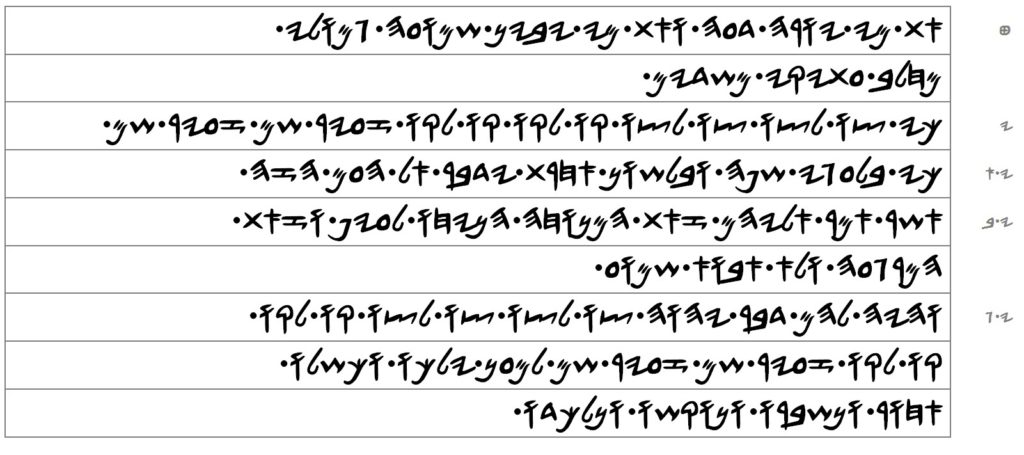
[9] ath may yorah daihh wa-ath may yabayn shamo’aihh gamolay ma-khalab ghathaykay ma-shadaym
Who will he teach knowledge? And who will he cause to understand preaching? The ones weaned from milk, the ones drawn from breasts.
[10] chay tso la-tso tso la-tso ko la-ko ko la-ko zai’ayr sham zai’ayr sham
For uttered word to uttered word, uttered word to uttered word, rule to rule, rule to rule, a little there, a little there.
[11] chay ba-laiga’ay shapah wa-ba-lashon akharath yadabar al ha-gham ha-zah
For by stammerings of lip and by another language will he speak to this nation
[12] ashar amar alay-ham za’ath ha-manokhah hanaykho la-ghayp wa-za’ath ha-maragaihh wa-la abo’ shamo’ai
who says to them: This is the rest. Cause to rest you all, to the weary; and this is the moment of refreshment: but I will not go listen.
[13] wA-hayh la-ham dabar YA’OH tso la-tso tso la-tso ko la-ko ko la-ko zai’ayr sham zai’ayr sham lamain yalacho wa-chashalo akhor wA-nashabaro wA-nokasho wA-nalachado
And it will be to them, the word of YA’OH, uttered word to uttered word, uttered word to uttered word, rule to rule, rule to rule, a little there, a little there, so that they will go and they will fall backwards and they will be broken and they will be snared and they will be taken.
COMMENTARY OF YASHAI-YA’OH 28:9-13
[Verse 9] There is no abrupt transition here. The prophet continues to point out the deficiencies and the shortcomings of the prophets who became addicted to alcohol and cannabis intoxication. They are not fit to teach or to preach. Yashai-Ya’oh mocks them by suggesting that small infants still breast feeding are their students. The babblings of an intoxicated prophet uttering nonsensical words are no different from the sounds babies make when they are trying to speak.
[Verse 10] This verse is not telling anyone how the biblical text should be interpreted, like the illiterate Black Hebrew Christian camps teach. It is talking about how the intoxicated prophet speaks like a toddler. The word tso/צו means “spoken commandment, spoken precept, uttered word.” Yashai-Ya’oh is mocking and mimicking the unintelligible sentences of an intoxicated prophet who utters word after word without making any sense. He is stringing together his words but they don’t have any meaning because he is drunk and/or high. The word ko/קו means “line, rule.” One line of a book after another is how children are taught to read, but the intoxicated prophet is incapable of staying focused. He utters line after line in the incorrect order.
The repetition of sounds in Ghabaray tso la-tso tso la-tso ko la-ko ko la-ko expresses the scorn of Yashai-Ya’oh to the intoxicated prophets who are speaking as if they are speaking a foreign language. The expression zai’ayr sham zai’ayr sham (a little there, a little there) is another repetition designed to mock the intoxicated prophet for his unintelligible baby talk. You feed children little by little to help them eat, and also in the manner of instructing them, but the communication of the intoxicated prophet is utterly useless even when it is little by little. It is not helping anyone due to his inability to express himself distinctly because he is intoxicated.
[Verse 11] This verse was misinterpreted by the apostate Paul in his letter to his heathen followers at Corinth wherein he not only misquotes the passage but takes it completely out of context: “In the law it is written, With men of other tongues and other lips will I speak unto this people; and yet for all that will they not hear me, saith the Lord” (1 Corinthians 14:21). A true teacher will not misquote scripture like this, nor will he dare add in his own words. What Paul is saying is that it was prophesied in the scripture that the word of YA’OH would be taught by men speaking other languages but that the people of Ya’oh-shar-al would still not listen. That is a lie. That is not what Yashai-Ya’oh 28:11 is saying at all.
The subject of the imperfect verb yadabar (he will speak) in the 3rd person, masculine, singular in this verse 11 is not YA’OH. The subject of this verb is the intoxicated prophet who speaks nonsensically like he is speaking a foreign language. To the person who is already high it may sound like the person they are listening to, who is also high, is dropping knowledge and spitting facts as they speak, but to the sober and sound of mind he is a babbling, mumbling idiot. That’s what this verse is saying. The people in those days were quick to accept as their prophet any man who was so drunk and so high he sounded like he was speaking a foreign language. That’s the kind of prophet they wanted according to May’chah 2:11. They rejected the men of sound mind and clear articulation, i.e. the prophets who were truly filled with the rokh of YA’OH to teach knowledge. They wanted a babbler instead.
The description of the “stammering tongue” re-appears in Yashai-Ya’oh 33:19 where it is prophesied that the remnant of Ya’oh-shar-al gathered to the second wilderness will hear the hospitable and friendly locals speaking their native dialects but the remnant of Ya’oh-shar-al will not be able to understand them. In 1 Corinthians 14:21, the words are applied by the apostate Paul to the phony “gift of tongues,” which, in its ecstatic utterances, is always unintelligible to those who hear it, and is therefore, as the heathen foreigner speaking a strange language was in the thoughts of the prophet Yashai-Ya’oh, the very antithesis of true prophetic teaching.
[Verse 12] It is still the intoxicated prophet who is speaking when he says za’ath ha-manokhah (this is the rest). He is trying to convince people that getting drunk and getting high is the rest. He claims it is their way of escape, and their moment of refreshment. But the prophet Yashai-Ya’oh would have none of it. He would not go listen. The word abo’/אבוא in the latter part of verse 12 is not from the root abah/אבה (to will) in the 3rd person, common, plural. The verb abo’ is conjugated from bo’/בוא (to go) in the imperfect 1st person, common, singular. It is not “they would not listen,” as the 1611 Queen James Virus has it by following the Masoretic punctuation, but rather the prophet Yashai-Ya’oh himself will not go listen to the nonsense being taught by intoxicated prophets who were literally alcoholics and the precursors of modern-day drug pushers.
[Verse 13] wA-hayh la-ham (and it will be to them) is talking about the intoxicated prophets. They are the ones who when they hear the word of YA’OH enunciated clearly by a true prophet it will sound to them like the unintelligible nonsense they speak when they are drunk and high. Since they will not understand the word of YA’OH when they hear it they will go and they will fall backwards and they will be broken and they will be snared and they will be taken.
This verse is not saying that YA’OH will speak to the people in other languages. It is saying that the intoxicated prophets and the people following them will not understand the word of YA’OH in their OWN language, even when it is broken down and explained so simply that a small child may comprehend it. It will sound like a foreign language to them, just as they appear to be speaking a foreign language when they are intoxicated. Therefore, they will be destroyed for being wilfully ignorant, for being addicted to alcohol and cannabis, and for obstinately refusing to receive instruction and correction.
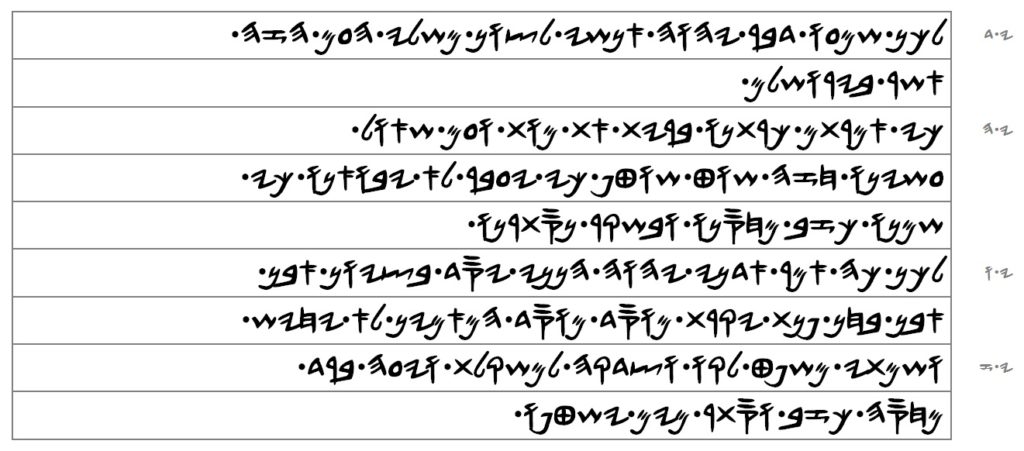
[14] lachan shamai’o dabar YA’OH anashay latson mashalay ha-gham ha-zah ashar ba-Yaroshalam
Therefore, hear the word of YA’OH, you men of a foreign language, the ones ruling this nation which is in Yaroshalam.
[15] chay amartham charathno barayth ath moth wa-gham sha’ol ghashayno khazah shot shotap chay yaibar la yabo’ano chay shamano chazab makhasno wa-ba-shakar nasatharno
for you all said: We have cut a covenant with death, and with sha’ol have we made an agreement: the overflowing scourge, when it passes by not will it come to us because we have made a lie our refuge, and in falsehood have we hidden ourselves.
[16] lachan chah amar adanay YA’OH hananay yasad ba-Tsay’on aban aban bakhan panath yakarath mosad mosad ha-ma’amayn la yakhaysh
Therefore, thus says the Lord YA’OH: Behold, I am the one laying in Tsay’on a stone; a tried stone, the corner of a precious one; a sure foundation. The one who believes will not be in a rush.
[17] wA-shamthay mashpat la-ko wa-tsadakah la-mashkalath wa-yaih barad makhsah chazab wa-sathar maym yashatapo
And I will put judgment to the line and righteousness to the plummet: and the stones from heaven will sweep away the refuge of a lie, and the hiding place will the waters overflow.
COMMENTARY OF YASHAI-YA’OH 28:14-17
[Verse 14] This verse is another jab from Yashai-Ya’oh at the intoxicated priests and prophets who, because they are inebriated and high, they speak nonsensically like they are speaking a foreign language. The noun latson/לצון from the verbal root lots/לוצ does not mean “scorn” no matter how many times you see it rendered this way in heathen English bibles. It is rendered that way because if it were to be translated correctly it would invalidate every translation of the scriptures that have been made into a heathen tongue. The verb lots occurs 27 times in the scriptures and each time it means “to speak a foreign language” (e.g. Thorah 1.42:23), and thus the noun latson means “a foreign language.”
Here is another example: “the one speaking a foreign tongue, you will smite; and the simple will you beware and rebuke; to the one who understands, he will understand knowledge” (Mashlay [Proverbs] 19:25).
A language chauvinist named King Shalamah (Solomon) wrote the above proverb. He was not warning people that they must never speak in a rude, disrespectful, scornful manner or risk being struck by someone holding a position of authority, as the heathen translations of this passage would have you believe. He was warning that only the king’s language, Shalamah’s language, is to be spoken within the borders of his kingdom. This is the common sense rule practiced to this day, with varying degrees of strictness, among virtually every kingdom and nation state on earth with its own official language.
If you emigrate to England from Russia, and Russian is the only language you speak, you must learn to speak English immediately. It is not an option for you to take your time and decide. It is a must and it is something you have to learn to do as quickly as possible, that is if you wish to get on in that country and be fully embraced by its society. Otherwise you will be ostracized and marginalized. In Shalamah’s day you would be physically assaulted for living within the borders of his kingdom but not knowing how to speak Ghabarayth (i.e. biblical Hebrew). This explains why one of the reasons Nakham-Ya’oh (Nehemiah) resorted to physical violence with the people who returned to the land after the Babylonian exile was because the children in Yaroshalam at that time were not being taught how to speak Ghabarayth (Nakham-Ya’oh 13:24-25).
If the translators of the 1611 Queen James Virus had translated Mashlay 19:25 correctly they would have shot their own English translation in the foot and killed their version of the bible, the most successful book in human history, before it ever flew off the printing press. It is the flying scroll prophesied by Zachar-Ya’oh (Zecharaiah) in chapter 5, verses 1-4.
[Verse 15] This is basically the delusional mindset one may have when they are addicted to alcohol and cannabis. They don’t care what happens to them anymore. As long as they are drunk or high the sky could literally be falling down and it will not alarm them. They are ready to die because they believe they wont feel a thing when death comes. It is like the ostrich that hides its head in the sand thinking that the predator will not see the rest of its body. They have convinced themselves to believe in a lie. They have hidden themselves in a falsehood. The scourge will not touch them when it passes by, so they say, because they will be too drunk and too high to even notice it when it passes.
[Verse 16] This verse has absolutely nothing to do with Christianity despite repeated claims to the contrary. Many of the people of Ya’oh-shar-al in the days of the prophet Yashai-Ya’oh were addicts and substance abusers, and many of them are addicts and substance abusers today in the land of the pyramids in the New World where they were brought by ships to be punished. Like their ancestors of old, many have made a covenant with death and they have stopped caring about life and what happens to them. They just want to numb themselves and enjoy an illusory feel good escape from the harsh realities of exile in the land of their oppressors.
The prophet looks far ahead into the future and declares that YA’OH will solve all the dilemmas and social ills which He sent to cripple and to plague His disobedient people. He will do it by laying a precious foundation stone that cannot ever be moved. The Tsay’on (Zion) that YA’OH speaks of in this verse is the Tsay’on He will establish in the second wilderness after He gathers a remnant of His people there. This cannot be the Tsay’on of old that now sits in ruins in the promised land. That foundation was removed and destroyed. Yet the foundation He will lay in the second wilderness is a new beginning that will never be removed and destroyed. It will grow and it will prosper and it will return to the promised land and take the land back from the heathens who currently occupy it. This stone is a sure stone that will never be overturned.
ha-ma’amayn la yakhaysh (the one who believes will not be in a rush). What does this mean? The stone YA’OH lays in the second wilderness will be there for a time, times, and a half. This encrypted time-span amounts to 98 years when you perform the proper calculation. That means the people of Ya’oh-shar-al who will make up the remnant will have plenty of time to be restored as a people in the wilderness prior to returning to the promised land. There will be no need to be in haste or to rush things. They will live in confidence, in security, and in shalom in the wilderness. You move differently, at a slower pace and with more confidence, when you know that time is on your side.
[Verse 17] The ko (line) and the mashkalath (plummet) are instruments used in construction, and also demolition. YA’OH is going to demolish the whole world by His wonders of nature after He has finished gathering His remnant to the second wilderness. Those of His people who are not gathered will be caught up in the destruction, and will be overwhelmed by the downpour of stones falling from heaven, and by the downpour of waters overflowing.
This verse harks back to verse 2 where the eleven tribes are threatened with catastrophic weather. Now Ya’ohdah is threatened the same way. The ferocity of the storms that YA’OH intends to send upon the earth will sweep away the lie that you can hide from Him. There is no place where you can hide from Him. Alcohol and cannabis will not shelter you. The only safe place will be the second wilderness where YA’OH is selectively gathering His remnant, as we speak, one by one in fulfillment of Yashai-Ya’oh 27:12-13 and Yaram-Ya’oh 3:14.
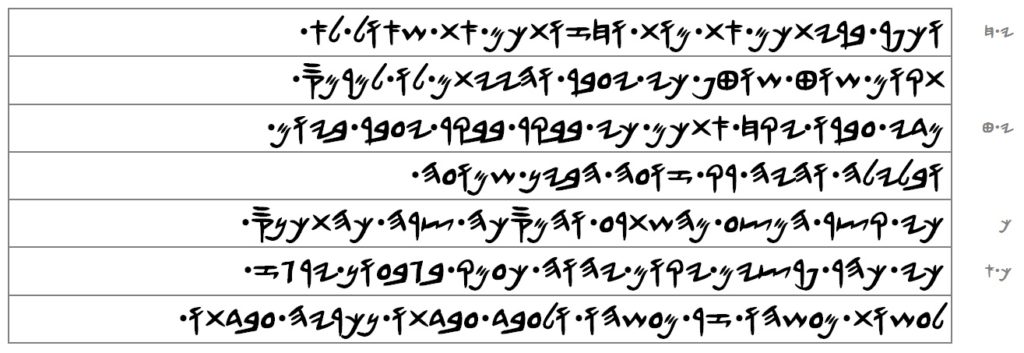
[18] wA-chapar barayth-cham ath moth wa-khazoth-cham ath sha’ol la thakom shot shotap chay yaibar wA-hay’ay-tham lo la-marmas
And it will be covered over, your covenant with death; and your agreement with sha’ol will not stand. The scourge overflowing will pass through, and you will be to it for a treading down.
[19] ma-day ghabar-o yakakh ath-cham chay ba-bakar ba-bakar yaibar ba-yom wa-ba-laylah wA-hayh rak zo’aihh habayn shamo’aihh
From enough passing through of it will take you all: for by morning by morning will it pass through, by day and by night; and it will be only terror understanding the report.
[20] chay katsar ha-matsai ma-hashatharai wa-ha-maschah tsarah cha-hathachanas
For short is the bed from stretching himself, and the covering narrow when entering himself.
[21] chay cha-har Paratsaym yakom YA’OH cha-ghamak ba-Gabai’on yaragaz la-ghashoth maish-ho zar maish-ho wa-la-ghabad ghabadath-o nacharayhh ghabadath-o
For as mount Paratsaym will YA’OH rise up, as the valley in Gabai’on will He be enraged to do His work, strange is His work, and to serve His service, barbarous is His service.
COMMENTARY OF YASHAI-YA’OH 28:18-21
[Verse 18] The covenant made with death is the pact made with alcohol and cannabis which were being trusted in by the users to keep them from feeling the pain of the shot shotap (scourge overflowing) when it passes through. That covenant will be covered over and rendered useless. So will the agreement with sha’ol, which is another reference to seeking escape and shelter via substance addiction. The shot shotap that will tread them down, regardless of their covenant and their agreement, is the catastrophic weather that will descend upon the entire world during the extended period of the wonder years for a time, times, and a half. This is made more clear in the following verse.
[Verse 19] The judgment to come will be a protracted visitation like the repeated blows of a scourge. This is not describing the Assyrian invasions of Ya’oh-shar-al and Ya’ohdah since they only occurred a few times (you could count them on one hand) and over a short period. On the other hand, this scourge will pass through morning after morning, day by day and by night. It is not just a report of the scourge that will frighten people. It is the scourge itself creating sheer terror and mass hysteria as people attempt to understand the news reports and try to make sense of what is happening in the world. They will be at their wits end, and plunged into the darkness of chaos. This isn’t anything the people of the world have ever experienced yet.
[Verse 20] The expression no doubt implies shortages everywhere one looks. The beds will not be long enough, meaning people will not be getting enough sleep. There will be restlessness all over the world due to extreme fear in the night. The covering that a person covers themselves with will be too narrow, meaning there will not be enough clothes or enough shelter for anyone during this time of great peril. The super rich will also be in dire straits to the same degree as the beggar. Everyone will suffer and millions upon millions will die.
[Verse 21] The mount Paratsaym (Perazim) of this passage is the same as the “Bail-Paratsaym” of 1 Chronicles 14:11-16, where Do’ayd completely defeated his enemies. This victory, since it spilled over into Gabai’on (Gibeon), is connected with a much earlier one when Ya’ohshai (Joshua) slaughtered the enemy in the valley of Gabai’on according to Ya’ohshai 10:6-14. In each instance, YA’OH used a man to utterly destroy the enemy miraculously, with the earlier war having wondrous portents from heaven destroy more of the enemy than the men of Ya’ohshai. Likewise, when YA’OH rises up to destroy the whole world by His wondrous portents of nature He will use a man to call forth these wonders and they will break forth upon the earth as paratsaym (breaches). That man will be filled with anger from the rokh of YA’OH because YA’OH intends to use him to carry out His strange work, and His barbarous service on behalf of His remnant in the second wilderness.
The strange work and the barbarous service will be to destroy the whole world and all of its armies, to eliminate the enemies of Ya’oh-shar-al, and to devote all of their wealth unto the Lord of the whole earth (May’chah 4:11-13).
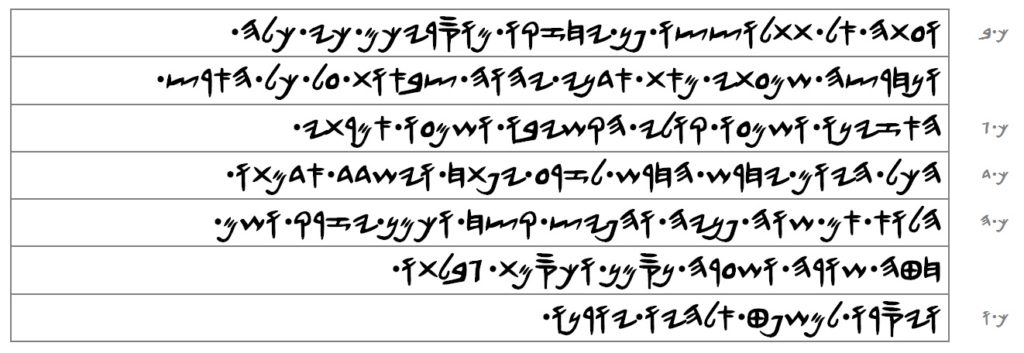
[22] wa-ghathah al thathalotsatso pan yakhazako mosaray-cham chay chalah wa-nakharatsah shamaithay ma-ath adanay YA’OH tsaba’oth ghal chal ha-arats
And now, do not speak a foreign language to one another, lest they will be strong your bonds: for an end, even a determination, have I heard from the Lord YA’OH of Hosts upon the whole earth.
[23] ha’azayno wa-shamaio kol-ay hakshaybo wa-shamaio amarathay
Give ear you all, and hear my voice! Hearken you all, and hear my speech!
[24] ha-chal ha-yom yakharash ha-kharash la-zarai yapathakh wa-yashadad adamatho
Is it all the day that he will plow, the plowman, to sow? He will furrow and harrow his ground.
[25] ha-lo’ am shoh panay-ha wa-hapayts katsakh wa-chaman yazarak wa-sham khatah shorah wa-shairah nasaman wa-chasamath gabalath-o
Is it not, when he has made plain the face thereof, he will disperse abroad the black poppy, and the cummin will he strew, and he will put wheat a row, and the appointed piece the barley, and spelt the border thereof?
[26] wA-yasaro la-mashpat alah’ay’o yorano
And He will instruct him for judgment, his Higher Power will teach him.
COMMENTARY OF YASHAI-YA’OH 28:22-26
[Verse 22] This verse predicts enslavement and exile in a foreign land where the people of Ya’oh-shar-al will be forced to adopt the foreign languages of their oppressors. The reflexive verb thathalotsatso/תתלוצצו in the 2nd person, masculine, plural, from the root lots/לוצ (see verse 14), does not mean “mockers.” It means to speak to one another in a foreign language. However, the words wa-ghathah (and now) appearing right before the injunction indicate that the time will come when the exiles of Ya’oh-shar-al will be able to decide whether to keep speaking the language of their oppressor or stop speaking it, and they are ordered to stop speaking it, or else their bondage will be strengthened.
This is practical instruction, for an oppressed people stripped of their true identity from the curses of the law cannot hope to renew themselves if they cling to the strange languages their oppressors used to make them better slaves. It is counterintuitive to think the people will awaken in exile to reclaim their lost identity but not their own language as well. You are still a slave if the only language you speak is the language the slavemaster made you speak in order that you would be of service to him. His language is a method of control. It is a delivery system for the beliefs and worldview he wants you to have, even if they appear to be at odds with his own. As long as he is deciding what you believe he remains in control. His language is also his weapon.
The order to stop speaking a foreign language is tied to the words chay chalah wa-nakharatsah shamaithay ma-ath adanay YA’OH tsaba’oth ghal chal ha-arats (for an end, even a determination, have I heard from the Lord YA’OH of Hosts upon the whole earth). In what way are these connected? The prophet Yashai-Ya’oh is actually repeating something he said in Yashai-Ya’oh 10:22-23. In those passages the prophet relates how the people of Ya’oh-shar-al, although more numerous than the sand of the sea, only a remnant of them will be redeemed and the vast majority who remain will be consumed.
In other words, the ones who are turned to speak the pure language again in their exile, “beyond the rivers of Chosh,” which is the New World beyond the African continent, their point of departure to the Americas in ships, they will make up the redeemed remnant (Tsapan-Ya’oh 3:9-10). Whereas the vast majority of Ya’oh-shar-al who cling to their oppressor by clinging to his strange language will be consumed along with the whole earth. That is the consumption determined in the midst of the whole earth. That is the determination of YA’OH to bring an end to our bondage in the world for ever. It all begins with saying His name correctly which is the very foundation of the pure language.
[Verse 23] The prophet is now about to say something that requires the reader’s full and undivided attention.
[Verse 24] The husbandman knows he does not have all day for plowing. He needs to use some of that day for sowing seed after he has furrowed and harrowed his ground to prepare the soil to receive the seed.
[Verse 25] Once he has finished leveling the surface of the ground and opening plow rows he will disperse various seeds into their assigned places. The black poppy seed and the cummin are scattered and strewn about; the wheat seed is carefully put in its own row; the barley seed to its own appointed piece; and the spelt seed in a border surrounding the barley to protect it. Hence, of the five crops named, the wheat and the barley are the most valuable.
[Verse 26] This verse tells us that the tiller of the soil is a man who has been instructed by YA’OH for mashpat (judgment). The tiller will be taught directly by YA’OH Himself. Thus, the parable is not meant to be understood as a literal description of agriculture and husbandry. The tiller is obviously a prophet, and a very important one at that.

[27] chay la ba-kharots yodash katsakh wa-‘opan ghagalah ghal chaman yosab chay ba-matah yakhabat katsakh wa-chaman ba-shabat
For not by a threshing instrument will he thresh out black poppy, nor the wheel of a wagon upon the cummin will be turned about; for by a stout staff will he beat out black poppy, and cummin by a slender rod.
[28] lakham yodak chay la la-natsakh adosh yadoshno wa-hamam galgal ghagalatho wa-parashay’o la yadak-no
Bread flour will be crushed but not for ever threshing will he thresh it and move noisily the wheel of his wagon; and his war horsemen, not will they crush it.
[29] gam za’ath ma-gham YA’OH tsaba’oth yatsah haplay’ ghatsah hagdayl thoshayhh
Even this from with YA’OH of Hosts it comes forth. He has caused wonderful counsel; He has caused great intelligence.
COMMENTARY OF YASHAI-YA’OH 28:27-29
[Verse 27] The black poppy is a hard plant but too tender to be subjected to the rude treatment of a threshing instrument (a threshing-sledge or threshing-wagon). A stout staff is to be used instead. The softer cummin is separated from its case by a slender rod or flail.
[Verse 28] Care is taken not to injure the grain flour though it must be crushed by rolling the noisy wheels of a threshing wagon over it. The mention in this verse of war horsemen as employed in agriculture is suspicious. Here the main bearing of the mystery behind the whole parable appears. The prophet Yashai-Ya’oh is not talking about agriculture in verses 24-28. He is talking about war. Nor is he talking about farming tools. He is talking about the wonders of nature as the weapons of war.
The plowman who knows he has to manage his time wisely in the day for both plowing and sowing is a warrior-prophet and his war is with the whole world. The first phase of the war is to furrow and harrow his ground. This is the sudden breaching forth upon the enemy mentioned in verse 21. The earth will be violently carved and plowed open by horrific wonders of nature summoned forth by this prophet. The next phase of the war is sowing seeds. These are yet more catastrophic wonders to come down from YA’OH in heaven. The black poppy and cummin are deadly disasters that will be scattered and strewn about the earth indiscriminately. But the wheat and the barley are carefully aimed at specific targets of interest. YA’OH is instructing and teaching the prophet and showing him where to put each seed for each judgment.
As time passes the crops will become harvest ready. The black poppy is beaten out with a stout staff. This is another catastrophic wonder summoned forth by the prophet, but it will not be as severe as the wonders in the first phase of the war. The cummin is separated by a slender rod, another catastrophic wonder, but not as dangerous a wonder as the stout staff used to beat out the black poppy. The bread flour made from the two most valuable crops of wheat and barley is to be crushed by the rude and noisy wheels of the threshing wagon. This catastrophic wonder is excessive. The crushing will not persist, however, or the benefits from these two crops would be lost. Neither will the war horsemen of the prophet, the deadliest of all catastrophic wonders of nature at the prophet’s disposal, be summoned forth to crush it.
[Verse 29] Hidden behind the veil of this agriculture parable are the prudent dealings of a warrior-prophet conducting his warfare against the world according to the instruction of YA’OH and using the wonderful ghatsah (counsel) and the great thoshayhh (intelligence) implanted in him by YA’OH who is the sole proprietor of them (Mashlay 8:14).
The chapter began with the prophet Yashai-Ya’oh condemning Aparaym in the north and then Ya’ohdah in the south for the vices and indulgences of their priests and their prophets with alcohol and cannabis. Because they pursued intoxication they were not qualified to teach because they sounded like they were speaking a foreign language with stammering lips. YA’OH orders His awakened redeemed to put away the foreign language of the oppressor and to learn the pure language. There is to be a foundation stone laid in the Tsay’on of the second wilderness where the remnant who are determined to re-learn the pure language of their ancestors will gather after departing from the land of pyramids in the New World where they had been brought by ships during the transatlantic slave trade.
Once YA’OH has finished gathering His remnant to the wilderness He will rise up to do His strange act and His barbarous service by anointing a prophet to summon forth catastrophic wonders of nature upon the whole world. The prophet will do as he is instructed and lay down punishments and chastisements where YA’OH wants them, and with greater degrees of severity in certain places than in others. All of this is designed to glorify YA’OH and to magnify and prosper His remnant so that they may return to the promised land (our wheat and our barley) located in the Levant and reclaim it for the twelve tribes with absolute authority. That land belongs to us and the one who gave it to us has a fearful and glorious name.
His name is YA’OH
Always has been. Always will be.
#EXODUS2023
1.15.7252 (April 5, 2023)

As always MABAYN GHAYT YA’OHDAH. I’m so much at ease nowadays since learning an being more conscious of our ancestors, language, and overstanding and knowing the true name of our HEAVENLY FATHER YA’OH. SHALOM AKH’AY. I’m truly glad I’ve removed the clouds of addiction that cannabis and alcohol can play on one’s life, I appreciate YA’OH for making it clear now that the rain of our captive is nearing its conclusion. HALALO ATH YA’OH.